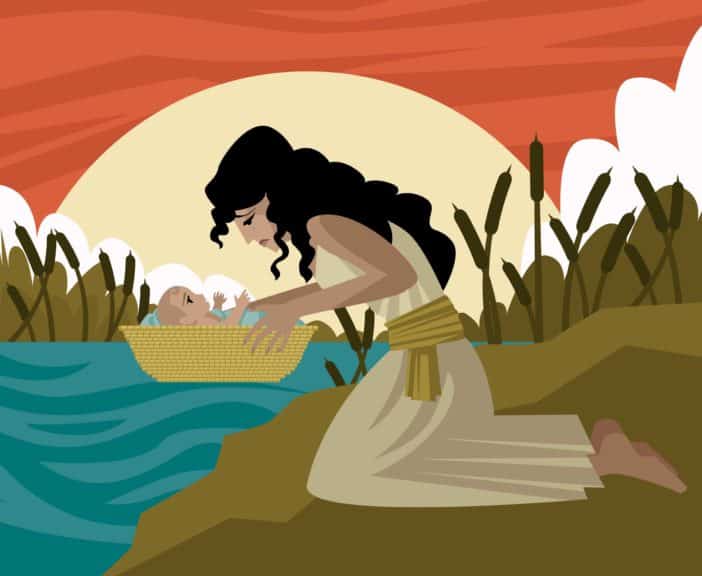Use this lesson to teach kids how God helps with difficult tasks.
STEP 1
Life Need
Today’s lesson from Exodus 3 and 4 describes the tough assignment God gave to Moses at the start of Moses’ leadership within the nation of Israel.
Young people your age are asked to do different kinds of jobs. Some of the work might seem easy to you, but other times it can be harder or just plain tough.
- Tell about a time you had to do a really hard job, and how you handled it. (Give opportunity to all who wish to answer. The idea is for everyone to think of times they’ve had tough things to do, whether or not they did them or were successful. If the sharing is going slowly, you should tell about a time you had a difficult assignment, and what you did.)
We’re usually more willing to attempt to do things we feel comfortable doing, aren’t we? But what about those tasks where we might fail?
Moses had tried to help God’s people and failed miserably. Now God had a new and difficult task for him. Do you think Moses will try again?
STEP 2
Bible Learning
Objective: That your students will discuss how God answered Moses’ excuses after calling him to complete a difficult task.
Materials:
- Bibles
Review with your students. Moses had been born around the time that Pharaoh ordered the deaths of all male babies.

Moses’ mother and sister Miriam hid Moses; then they placed him in the Nile, where he was rescued by the daughter of Pharaoh. This daughter of Pharaoh raised Moses as her own son.
When Moses was about 40 years old, he tried to help the Hebrew people by killing an Egyptian. He had to run away from Egypt, because Pharaoh wanted to kill him.
After Moses’ failure, he fled from Egypt. But God hadn’t forgotten about the Hebrews or Moses. This was all part of God’s master plan in which Moses was to play an important part.
Bible Study
Have students find Exodus 3 in their Bibles.
Ask a student to read Exodus 3:2-3.
- Who appeared to Moses? (An angel of the Lord.)
- What was strange about the bush? (It was on fire but it didn’t burn up.)
Ask for a volunteer to read the Exod. 3:7, 10-12.
- What did God want Moses to do? (To go to Pharaoh and bring the Israelites out of Egypt.)
- How did Moses answer God? (He said he wasn’t good enough to do what God asked.)
- How did God answer Moses? (God said He would go with Moses and help him.)
Ask for another volunteer to read Exod. 4:10-15.
- How did God offer to help Moses? (God would help Moses speak and teach him what to say.)
- How did Moses answer God? (He tried to get God to send someone else.)
- Why do you think Moses didn’t want to do what God wanted him to do? (He was afraid, embarrassed, didn’t speak well, wasn’t very confident.)
Bible Review
We can see that God was ready to provide for Moses’ needs by sending Aaron along with Moses, and by showing Moses how powerful He is. That knocked down every excuse that Moses had. Now, let’s take a look at some other ways that God prepared Moses for the assignment
The places where Moses was before this week’s Bible story (Exodus 1-2) were Goshen, the Nile River, and Midian. Point out how the Lord used the years Moses lived in Midian to prepare him to carry out God’s plan of salvation.
- What kinds of things do you think Moses had to learn in order to be able to care for sheep in the wilderness? (He probably had to learn how to find grass and water; how to protect the sheep from wild animals; how to find his way around and hunt for food.)
- How would knowing these things help Moses lead God’s people out of Egypt and into Canaan? (Moses would be able to take care of the Hebrew people in the wilderness like he did the sheep. God also used that time to prepare the Hebrews as a nation—the nation of Israel.)
Lead a discussion on the progression of Moses’ thinking.
- How do you think Moses felt when God told him that He was going to rescue the Hebrews from the Egyptians? (Relieved, thankful, happy.)
- How do you think Moses felt when told that he was the chosen leader and had to face Pharaoh and the Israelites again? (Frightened, worried, upset, unhappy.)
- Did God promise that Moses’ job would be easy or trouble free? (No.)
- What promises did God give Moses? (God promised to be with Moses, and assured Moses of this by miraculous signs. He also promised to help Moses speak and to send Aaron with him.)
- What do you think would be a comparable assignment in today’s world? (Allow some time for your students to think about an answer. Then suggest one of the following: demand freedom of worship for people living under religious persecution or rid our cities of drugs.)
STEP 3
Bible Application
Objective: That your students will describe ways the Lord strengthens His followers so they can tackle difficult tasks.
When we are faced with hard tasks, it isn’t always easy to accept the challenge, is it? The Bible study today was about someone who had a really tough assignment.
We saw how reluctant Moses was to do what God told him to do. But God didn’t just cross His arms and wait for Moses to muddle through the job alone.
He gave Moses the help He promised, and Moses was able to complete the work.
In our own lives, each of us has to face hard jobs. But we aren’t on our own—we have God’s help, even when we think we can’t do the work. In what tough assignment can you really use some help from God?
Let some students share their thoughts on specific tasks they know they have to face. Accept the ideas the students offer, as long as they are real-life situations that they will deal with in the next short while.

Some ideas you might hear: doing a hard school assignment or taking a test, finishing a project, playing in an athletic event, making friends in a new environment, doing some assigned task at home.
As your young people share their thoughts, show that you care about what they’re saying by listening carefully and giving each student your full attention. Set a good, caring atmosphere for others to listen: discourage whispering, creating distractions, or goofing off.
Memory Work
Have the class read this week’s Key Verse (Exodus 4:12) together. Then discuss these questions:
- How did God help Moses do what God told him to do?
- How can Moses’ experience help you in tough situations?
STEP 4
Life Response
Objective: That your students will agree to tackle a difficult task for God.
Materials:
- paper
- pens or pencils
- What does the word “volunteer” mean? (Offer or choose to do something without being asked.)
It means we have a choice to do something willingly—without being forced to do it.
- Why do we volunteer to do certain things? (Because we want to be helpful to others; we like to get involved with certain things; we please God when we serve Him.)
- How do you feel when you’ve finished a task that was hard—one you never thought you’d finish? (Allow for responses. Some possible answers are “I felt relieved”; “I felt great”; “I had more confidence in my abilities.”)
In what ways will you accept the challenge to serve God?
Suggest that students select one of the following: Clean your room or do some other chore for a whole week without being asked and without grumbling. Cheerfully help a younger brother or sister with homework or a chore. Make up your mind not to talk back to your parents. Share the good news of Jesus’ death and resurrection with a person you don’t know very well. Make friends with an enemy. Break a bad habit or help a friend do so.
Allow time for students to choose a specific task and write it down. Remember, God will provide you with the help you need to complete the task, just as He promised to help Moses!
Reach Every Student, Every Age and Every Day
Echoes Elementary consists of age-appropriate lessons that match the growing independence and responsibility of elementary students—especially their capacity to apply Bible truths and more deeply grasp the love of God.
Other articles inspired by Echoes Curriculum:












